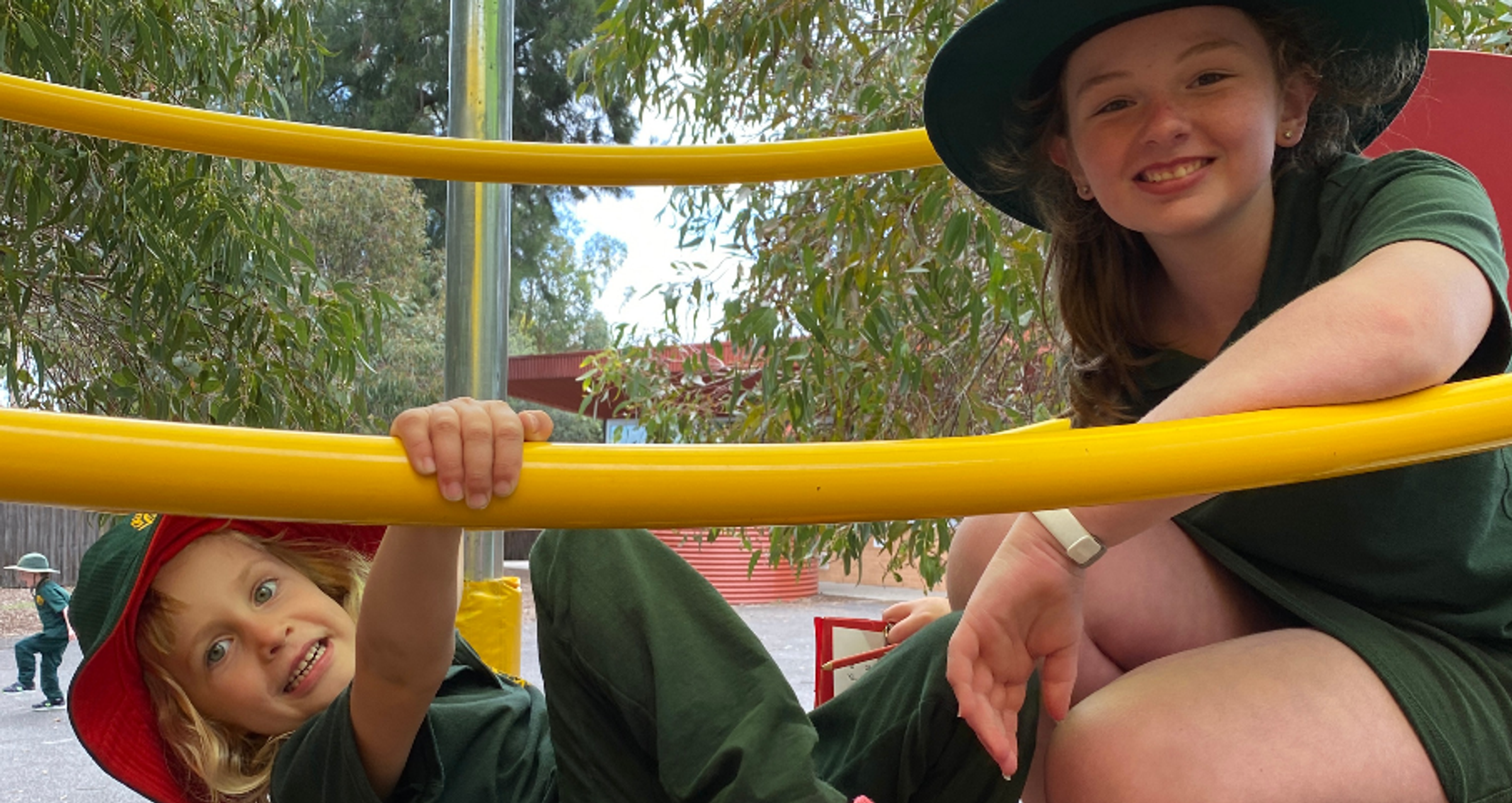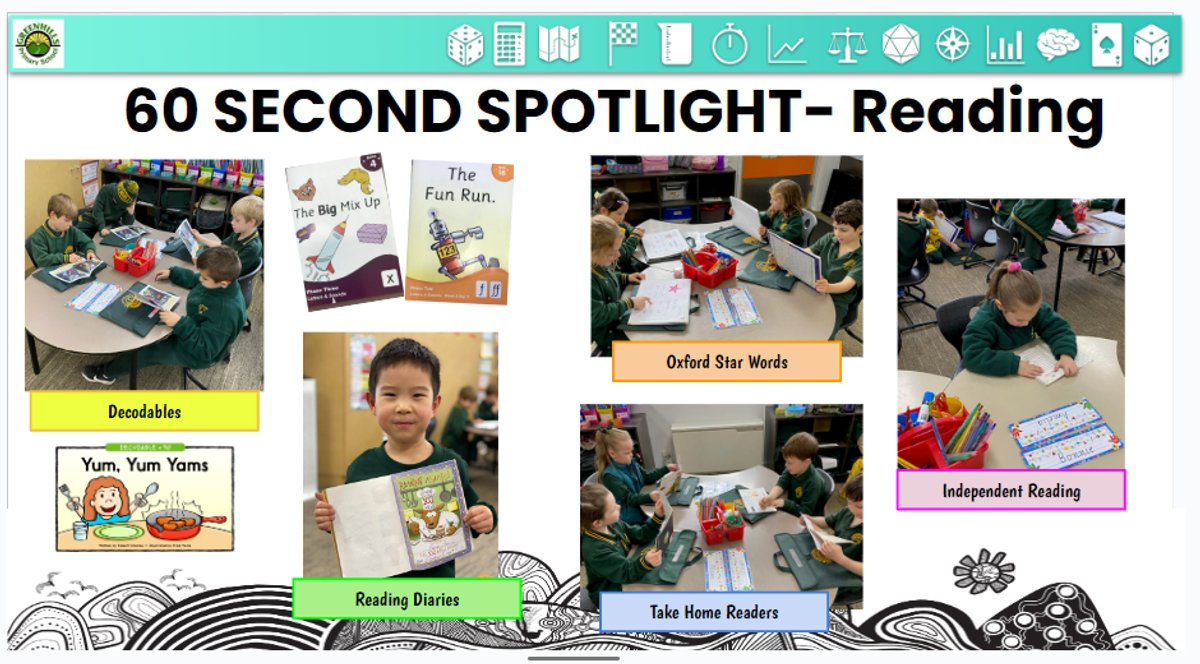Message from the Principal
James Penson

Message from the Principal
James Penson


At Greenhills, we know that reading is a foundational life skill and a source of pleasure and wonder. It provides access to information, generates imagination, builds knowledge, enables creativity and shapes opinions.
Recent media reports have outlined that all Victorian Government Schools will be teaching reading using a Phonics based program from 2025. I am pleased to say that phonics is a key component of how we teach reading and more importantly, one key component to how we build a life-long love of reading.
Our “balanced” approach that we use to teach reading in the early years of primary school, is supported by the strongest evidence, and is in full alignment with that is expected to be implemented in all Victorian government primary schools from 2025.
The essential elements of reading that we teach are known as the ‘Big 6’ (Konza, 2014). Each of these 6 elements form part of a structured and balanced literacy approach:
These are the foundational skills that have a reciprocal relationship and are all necessary to enable students to independently read and respond to increasingly complex fiction and non-fiction texts.
An example of all this in action is across all four of our Prep classes. Our Prep team work with Sharon Draper (Literacy Specialist) to deliver a daily routine of explicit phonics instruction and phonemic awareness. This is based on a specific scope and sequence. Our students use a balanced blend of decodables, readers and quality picture story books throughout literacy sessions. We encourage students to record and celebrate their daily reading through a reading diary and this is the most important part of our home learning program across the whole school. Our Oxford Star Words are an example of high frequency words that are the beginning of building vocabulary. We also ensure we have a rich array of engaging picture story books and non-fiction texts in our reading corners for students to enjoy and read independently.
From 9am on Wednesday 26th June, you will be able to access your child's Semester 1 Report via Compass. This report forms one element of our Continuous Reporting Program and follows the student work samples and matching teacher assessments that have been shared throughout this term and last term.
Our effort behind Continuous Reporting is to provide parents and carers with more frequent communication about your child/ren’s progress and assist you to develop a deeper understanding of how you child is assessed throughout the school year. Whilst our Continuous Reporting process continues to be developed and refined, we don’t want you to have to wait until a semester report before you find out about your child’s learning progress.
This semester, Janine, Brad and myself have been impressed by the effort that our students have put into their learning. Whilst we keep a close eye on the academic outcomes, we also looked carefully at the assessment of each student’s effort and attitude which are based around our G.R.E.A.T. values. To us, these are the most important indicators of future success and being able to fulfil potential.
I was also really impressed with the way our students have reflected on their learning through detailed and insightful comments in the “Student Self-Reflection” section. This part of the learning cycle, which is known as metacognition, is critically important. By supporting our students to develop agency in their learning (which can be learnt) our students can improve their learning outcomes.
The key in all of this is to remember that a student's ability to become a self-regulated (i.e., metacognitive) learner is understanding that one's ability to learn is a skill that develops over time rather than a fixed trait, inherited at birth. Students who believe that the ability to learn can improve over time have greater levels of achievement, even after controlling for prior achievement (Henderson and Dweck, 1990). These students set reasonable learning goals for themselves and have the self-efficacy to choose and use productive learning strategies. These strategies then result in learning gains. Moreover, students can be taught that their ability to learn can improve over time; those who learn this simple lesson show increased motivation to learn and improved grades (Aronson et al., 2002; Blackwell et al., 2007).
Here is a selection of some sections from different student reflections from our 2024 Semester 1 Reports. I think you will agree that they provide clear evidence of our student’s increasing ability to articulate the specific strategies they are using in their learning in different subject areas, and most importantly their growing commitment to being responsible learners and develop strong student agency dispositions.
“An achievement this year has been getting into Maths Games because I have found it really good to learn new maths strategies. A highlight this year has been getting buddies. Why this was such a big highlight is that you have someone looking up to you as their older buddy. I also love showing them how GREAT Greenhills is.
In my student agency, I used to be really shy at putting my hand up. It was the thought of getting it wrong and everyone remembering that I got it wrong. But I know even if I get it wrong, no one really cares, it’s just about giving it a go. Now I out my hand up and if I get it wrong, I can try again. I am still working on it, but I am so much more confident.
My next step in my learning is to complete my reading goal. I will complete this by using my Reader’s Notebook as I am only one example of away. This goal has challenged me because I had to infer the character’s feelings without the book telling me. I am excited to get my next reading goal.
I want to be remembered at Greenhills as kind, caring and that I was a leader who showed all the GREAT values in everything I did. If I could leave a quote it would be “Great leaders don’t set out to be a leader...they set out to make a difference, It’s never about the role – always about the goal”. I want to show students to never give up and show effort in everything you do even if it’s hard, give it a go”. – Year 6 student.
“One of my learning achievements from this semester is understanding decimals. Before we started the unit, when I looked at a decimal point, I felt scared. But my teacher made me feel much more confident with decimals. Now when I look at a decimal point, I can add and subtract the decimal easily.
Next semester, I would like to work on keeping my narrative stories simple. Sometimes I will have so many ideas in my head the story will get too complicated and confusing. I also want to make my writing pieces more descriptive. Sometimes when I read through my writing, I can’t picture the setting or the characters in my mind.
I work best on my own when the classroom is quiet. It makes it easier for me to concentrate. I usually get my best work done when I am on my own.
A highlight this semester has been the cross-country race. I showed grit, effort and adventure, I showed these values by not giving up when I felt tired and pushed on”. - Year 5 student
“A highlight this semester has been STEAM. I really liked the skittles and water challenge. I really enjoy science. In my learning I am most proud of giving a speech for the Junior School Councillor for my classroom. I tried my hardest to get the role but I didn’t get it. I was happy for the student that did. I learnt from giving this speech to not be scared and to face my fer of talking to a crowd. I think I did really well. A learning goal I have is writing. I need to think about my work choices and vocabulary. I also need to try and include more adjectives, verbs, nouns and adverbs to describe the characters and the setting to make the story sound more interesting. I will achieve this by practising at home and doing more reading to give me more ideas to write about”. – Year 3 student.
“A highlight this year was having a new classroom and making new friends. I also like it because my teacher makes learning fun. Something that helps me learn is my teacher. I like it when they explain the work and then ask ‘does everyone understand what they need to do? Because if I don’t understand I just put my hand up.
Something I have improved in is my writing. I can sue vivid verbs now and it makes my writing more interesting. Something I want to improve on is my spelling. Some words are hard to spell but I try to break them up into parts. Sometimes I get them right”. – Year 1 student.
“Something that helps me learn is learning how to count because it helps me with my maths sums. Something I have improved in is counting by 2’s because now I can count by 2’s to 100. I am so proud. Something I want to improve on is showing GRIT when I find something hard. Not giving up and having a go even if I get the wrong answer. Mistakes help me learn”. – Year 1 student.
You can see what I mean! How wonderful are they and this is just a very small sample!? It is very clear that our 15 minute focus on student agency each morning, along with our weekly “Learning to Learn” sessions and our growing understanding of the impact strong student agency has is really starting to take shape.
I encourage you to download and print your child’s report and then read it with them. In particular, have a close look at the Learning Confidence / Attitude section completed by both the teacher and the student. You might like to discuss any differences that you notice between these two assessments and unpack more of what that could mean with your child.
A reminder that on our last day this term, Friday 28th June we will finish at 2.30pm. Our assembly will outdoors from 1.50pm (weather permitting).
This is the final call for any sibling enrolments for Prep in 2025. Early next term, we will be sending out confirmations of enrolments to families. It is vital that if you have a student starting school next year that you put in an enrolment form.
This will be my last newsletter for the term, as I am taking some Long Service Leave (commencing Wednesday 19th June through to the end of this term) and jetting off to Hawaii for 10 days. Janine Hough and Brad Ryan will be the Acting Principals during this time.
I hope that all our families get some time together to enjoy life away from the school routines and can come back refreshed for Term 3!
Finally, thank you for your continuous support of our school. I am so grateful the work of our dedicated staff, the engagement of our students each day and the home school partnership our school has built over such a long period of time. Working in our school each day is an absolute privilege because I see so many good things happening, and our students always have smiles on their faces. Greenhills is a GREAT place to be.
James Penson
Principal



